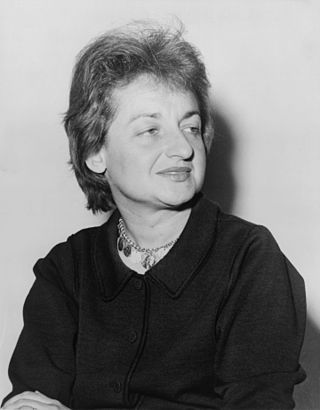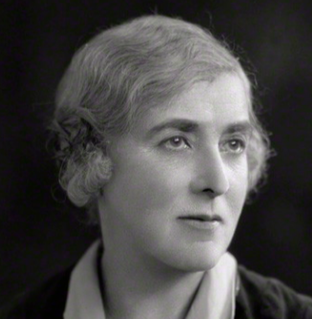
Betty Friedan was an American feminist writer and activist. A leading figure in the women's movement in the United States, her 1963 book The Feminine Mystique is often credited with sparking the second wave of American feminism in the 20th century. In 1966, Friedan co-founded and was elected the first president of the National Organization for Women (NOW), which aimed to bring women "into the mainstream of American society now [in] fully equal partnership with men.”

The Feminine Mystique is a book by American author Betty Friedan, widely credited with sparking second-wave feminism in the United States. First published by W. W. Norton on February 19, 1963, The Feminine Mystique became a bestseller, initially selling over a million copies. Friedan used the book to challenge the widely shared belief that "fulfillment as a woman had only one definition for American women after 1949—the housewife-mother."

The National Union of Women Teachers (NUWT) was a trade union representing women schoolteachers in Great Britain. It originated in 1904 as a campaign for equal pay for equal work, and dissolved in 1961, when this was achieved.
The Workhouse Visiting Society was an organisation set up in 1858 and existed "to improve moral and spiritual improvement of workhouse inmates" in England and Wales. The group was set up by Louisa Twining of the Twinings tea family. It began as a sub-committee of the National Association for the Promotion of Social Science. It was disbanded in 1865.

The Korean Red Cross, fully the Republic of Korea National Red Cross (Korean: 대한적십자사), is a humanitarian organization that provides emergency assistance, disaster relief and education inside South Korea. It is the designated South Korean affiliate of the International Federation of Red Cross and Red Crescent Societies.

Opera Canada is a quarterly music magazine published by Opera Canada Publications. It is the oldest continuously published arts magazine in Canada. It is an independent magazine separate from the Canadian Opera Association. Along with Opera and Opera News, in the 1990s, the magazine was considered to be one of the three major opera publications in the English-speaking world.
The Society for Promoting the Employment of Women (SPEW) was one of the earliest British women's organisations.

Richard Poole (1781–1870) was a Scottish physician, psychiatrist, and phrenologist.
The British Federation of Women Graduates (BFWG) was founded in 1907 as the British Federation of University Women (BFUW) to "afford a means of communication and of united action in matters affecting the interest of women". It was renamed the British Federation of Women Graduates in 1992. The current organisation "seeks to promote opportunities for women in education, and public life more generally" and provides "graduate women living in England, Scotland and Wales with information, support and friendship, at local, regional, national and international levels. Conferences, meetings, networks and social events, at all levels, are open to all members". The BFWG is affiliated to the International Federation of University Women (IFUW), of which it was a founder member, and University Women of Europe (UWE).
The Gay Women's Alternative, DC (GWA) (1981–1993) was an incorporated social-educational non-profit organization dedicated to enriching the cultural, intellectual, and social lives of lesbians of the Washington, D.C., area. The GWA was formed in 1980 to provide the DC lesbian community with an alternative and safe space to socialize and discuss feminist and educational topics concerning the lesbian and gay women population. The group met every Wednesday evening from 8 pm to 11 pm at the Washington Ethical Society near Silver Spring, Maryland. Weekly programs covered topics such as, "Organizing Your Finances for Success," "Lesbian Couples: How Different are we?" and "Women and Wellness: A Feminist Approach to Health Care". Speakers included black poet Audre Lorde, artist Joan E. Biren, television journalist Maureen Bunyan, and comedian Kate Karsten. The GWA held several dances, including the annual lesbian spring dance and the Spring Cotillion.
The Irish Housewives Association (IHA) was an influential pressure group founded in 1942 to speak out about injustices and the needs of Irish women, inside and outside the home. The organization continued until 1992, when it dissolved itself.
The Ladies' Alpine Club was founded in London in 1907 and was the first mountaineering club for women. It merged with the Alpine Club of Great Britain in 1975.

The Actresses' Franchise League was a women's suffrage organisation, mainly active in England.
The Married Women's Association (MWA) was a British women's organisation founded by Edith Summerskill and Juanita Frances in 1938. It was the first UK twentieth century pressure group to focus on the rights of housewives via the goal of legal and economic equality for spouses, and the consideration of undervalued childcare and work done in the home with its resultant financial consequences for women after divorce. The organisation's previously unexplored influence on the course of family law, especially on the Married Women's Property Act of 1964, a landmark in the timeline of women's equality, is now recognised.
The Anglican Group for the Ordination of Women to the Historic Ministry of the Church existed from 1930 to 1978. By research, education, publicity, and memorials to the church, it pushed the Church of England and the whole Anglican Communion to admit women to the historic three-fold ministry. By the time the organization disbanded in 1978, women had been ordained priests in four provinces of the Anglican Communion.

Helen Alexander Archdale was a Scottish feminist, suffragette and journalist. Archdale was the Sheffield branch organiser for the Women's Social and Political Union and later its prisoners' secretary in London.

The Ladies Empire Club was a private members' club for women. It was located at 69 Grosvenor Street, at the east end on the south side, in the Mayfair district of London.

The Yorkshire Ladies' Council of Education (YLCE) is an English charitable institution founded in 1875 to support women's education.
The National Joint Committee of Working Women's Organisations was an organisation representing women active in the labour movement in the United Kingdom.
Women's Total Abstinence Union (WTAU) was a British women's organization active during the temperance movement in the United Kingdom. Its headquarters were at 4 Ludgate Hill, London. In addition to a president, there were 41 vice-presidents. The general committee met four times a years and consisted of members of the Executive Committee and 40 others elected annually from the council meetings of delegates. The Executive Committee consisted of the officers and 23 elected members. There was a sub-committee for junior work.










